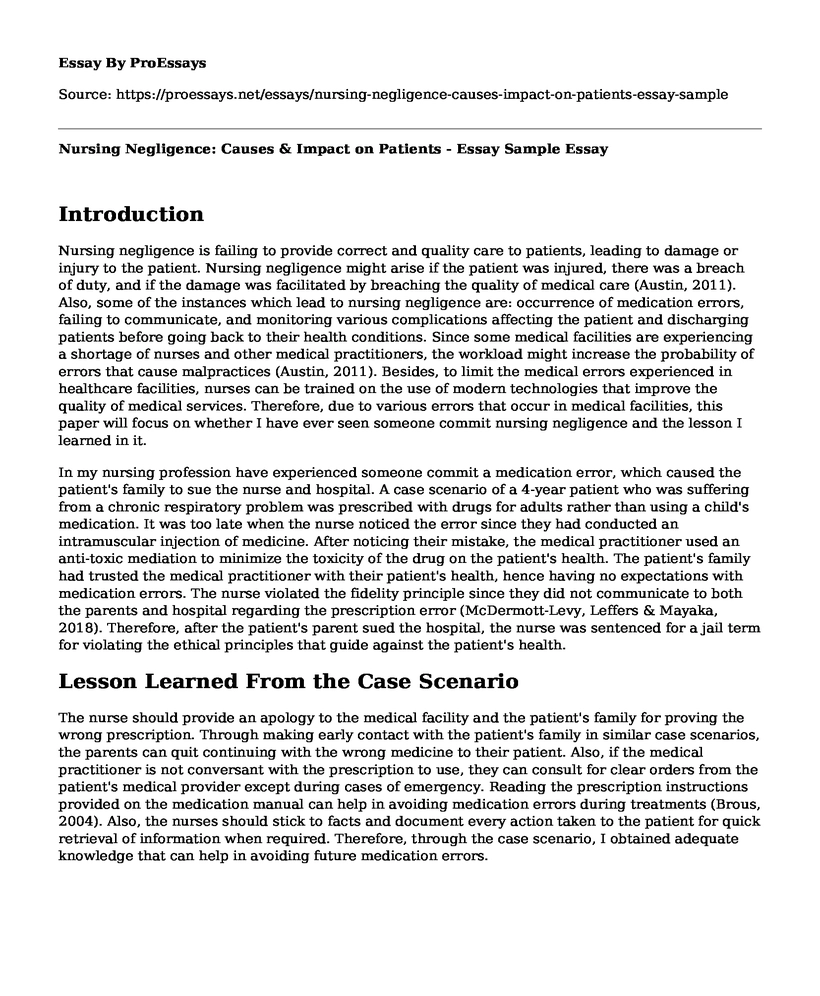Introduction
Nursing negligence is failing to provide correct and quality care to patients, leading to damage or injury to the patient. Nursing negligence might arise if the patient was injured, there was a breach of duty, and if the damage was facilitated by breaching the quality of medical care (Austin, 2011). Also, some of the instances which lead to nursing negligence are: occurrence of medication errors, failing to communicate, and monitoring various complications affecting the patient and discharging patients before going back to their health conditions. Since some medical facilities are experiencing a shortage of nurses and other medical practitioners, the workload might increase the probability of errors that cause malpractices (Austin, 2011). Besides, to limit the medical errors experienced in healthcare facilities, nurses can be trained on the use of modern technologies that improve the quality of medical services. Therefore, due to various errors that occur in medical facilities, this paper will focus on whether I have ever seen someone commit nursing negligence and the lesson I learned in it.
In my nursing profession have experienced someone commit a medication error, which caused the patient's family to sue the nurse and hospital. A case scenario of a 4-year patient who was suffering from a chronic respiratory problem was prescribed with drugs for adults rather than using a child's medication. It was too late when the nurse noticed the error since they had conducted an intramuscular injection of medicine. After noticing their mistake, the medical practitioner used an anti-toxic mediation to minimize the toxicity of the drug on the patient's health. The patient's family had trusted the medical practitioner with their patient's health, hence having no expectations with medication errors. The nurse violated the fidelity principle since they did not communicate to both the parents and hospital regarding the prescription error (McDermott-Levy, Leffers & Mayaka, 2018). Therefore, after the patient's parent sued the hospital, the nurse was sentenced for a jail term for violating the ethical principles that guide against the patient's health.
Lesson Learned From the Case Scenario
The nurse should provide an apology to the medical facility and the patient's family for proving the wrong prescription. Through making early contact with the patient's family in similar case scenarios, the parents can quit continuing with the wrong medicine to their patient. Also, if the medical practitioner is not conversant with the prescription to use, they can consult for clear orders from the patient's medical provider except during cases of emergency. Reading the prescription instructions provided on the medication manual can help in avoiding medication errors during treatments (Brous, 2004). Also, the nurses should stick to facts and document every action taken to the patient for quick retrieval of information when required. Therefore, through the case scenario, I obtained adequate knowledge that can help in avoiding future medication errors.
Conclusion
Nursing negligence tends to cost the lives of patients whenever some cases are not dealt with on time. Avoiding various instructions when offering medical care to patients leads to prescription errors that put the life of a patient into risk. Besides, being careful with medications such as determining the right drug, right patient, right time, and the route can help to avoid the dosage errors. Since some medical facilities are experiencing a shortage of nurses and other medical practitioners, the workload might increase the probability of mistakes that cause malpractices. Therefore, committing various errors in the nursing profession, it violates the ethical principles which are considered in medical facilities to ensure quality dissemination of services.
References
Austin, S. (2011). Stay out of court with proper documentation. Nursing2018, 41(4), 24-29. Retrieved from http://journals.lww.com/nursing/Fulltext/2011/04000/Stay_out_of_court_with_proper_documentation.11.aspx
Brous, E. A. (2004). 7 tips on avoiding malpractice claims: Careful practice and documentation help keep you out of court. Nursing2019, 34, 16-18. Retrieved from https://journals.lww.com/nursing/Fulltext/2004/06001/7_tips_on_avoiding_malpractice_claims__Careful.7.aspx
McDermott-Levy, R., Leffers, J., & Mayaka, J. (2018). Ethical principles and guidelines of global health nursing practice. Nursing Outlook, 66(5), 473-481. Retrieved from https://www.sciencedirect.com/science/article/abs/pii/S0029655418301738
Cite this page
Nursing Negligence: Causes & Impact on Patients - Essay Sample. (2023, Mar 22). Retrieved from https://proessays.net/essays/nursing-negligence-causes-impact-on-patients-essay-sample
If you are the original author of this essay and no longer wish to have it published on the ProEssays website, please click below to request its removal:
- Are Radiographers and Other Professionals Safe When Operating an O-arm Imaging System in a Surgical Room?
- Challenges Facing Nursing Leadership - Research Paper
- Essay Sample on Juul: Leading US E-Cigarette Company Since 2015
- Essay Sample on Chronic Sleep Disorders & Sleep Loss: A Global Public Health Crisis
- Essay on AHIMA: Nonprofit for Health Information Management Professionals
- Essay Example on Nutrition: Essential Nutrients for Optimal Health
- Antibiotic for Treating Tuberculosis - Essay Example







